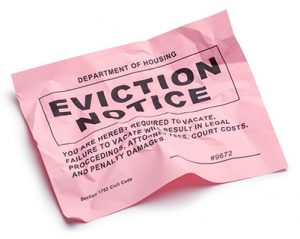During this stressful year of the global pandemic hitting, adding the pressures of bankruptcy to the mix affects everyone as well. On September 4, 2020, the Centers for Disease Control and Prevention (CDC) issued the “Temporary Halt in Residential Evictions To Prevent the Further Spread of COVID-19” (the “Eviction Moratorium”) to help prevent the spread of COVID-19.
Other eviction bans may apply in certain situations, and it is possible that the federal ban could be extended further if necessary. The Eviction Moratorium set the guideline of the minimum protections for residential tenants and does not preempt state and local governments from enacting their own eviction moratoriums with further protections.
Bankruptcy courts have been dealing with these matters under the dire financial distress that has arisen during this pandemic.
Throughout the course of the pandemic, many landlords and their tenants have had to address rental shortfalls and other emergencies. Renters who were unable to pay rent in cases where an eviction ban was not fully in effect, may have filed for bankruptcy in order to stop or slow the eviction process – with the consequences leading to landlords not receiving rent being unable to make their mortgage payments and also facing foreclosure or bankruptcy.
When either a tenant or a landlord files for bankruptcy, the lease can be allowed to continue as normal, or it can be canceled.
If the landlord has filed for bankruptcy and the tenant assumes the lease, the tenant is promising to pay the rent and maintain the property to be as clean and as safe as possible. If the tenant has filed for bankruptcy, then the landlord is obligated to keep the property maintained and habitable.
In the event that a landlord files for bankruptcy and the lease is canceled by the tenant, the landlord could serve a notice to vacate. If the tenant does not leave after the term of the notice, the landlord can then proceed to file for an eviction.
If the lease is canceled by the landlord, the tenant can file a claim in the landlord’s bankruptcy case for damages of the early termination. The tenant may be able to legally remain living in the property for the duration of the lease and may be able to have the rental payments reduced if the landlord is no longer providing essentials such as heat, electricity, water, general maintenance, or trash removal – if those things were being supplied by the landlord previously.
 In the case that it is a tenant who has filed for bankruptcy, creditors cannot seek money and landlords are prevented from evicting the tenant, unless the landlord had already obtained an order of eviction before the tenant had filed. If the tenant files for bankruptcy after an order of eviction, they may be able to stop the order by paying any rent owed through 30 days after the bankruptcy filing.
In the case that it is a tenant who has filed for bankruptcy, creditors cannot seek money and landlords are prevented from evicting the tenant, unless the landlord had already obtained an order of eviction before the tenant had filed. If the tenant files for bankruptcy after an order of eviction, they may be able to stop the order by paying any rent owed through 30 days after the bankruptcy filing.
Then the tenant stays in the premises any time after the bankruptcy is filed, the claim for the rent covering this period of time is considered to be what is called an administrative claim. Administrative claims are post-petition claims that are typically paid before any other claims are paid in the bankruptcy. This applies whether the tenant has filed a Chapter 11 or a Chapter 7. Therefore, to the extent that there is any money available to pay any creditors, the rent incurred after the bankruptcy commenced will be paid. If there is not enough money to pay all of the administrative claimants (anyone providing goods or services to the bankrupt tenant after commencement of the bankruptcy), then the administrative claimants shall all share proportionately in whatever money is available.
Any rent amount that was owed for periods before bankruptcy was filed (pre-petition rent) is considered as an unsecured claim, making it the last type of claim to be paid – and likely to be severely discounted if paid at all.
When a tenant files for bankruptcy, all collection actions against the tenant are halted. An automatic stay is created upon filing bankruptcy, which means that creditors cannot take any action against the debtor without the court’s permission. However, the landlord can still pursue and collect back rent from any guarantors named under the lease, even while the tenant is in bankruptcy.
Most rental leases contain provisions stating that if the tenant files bankruptcy, the lease is breached and the tenant may be evicted, but regardless of what the lease states, the law forbids the landlord from declaring a termination or breach of the lease simply as a result of bankruptcy. Provisions that make the performance of the lease more onerous after a bankruptcy is filed are also unlawful. As an example, a lease cannot require a tenant to have to pay more rent or increase the security deposit just because of the bankruptcy.
While bankruptcy is frustrating for all involved, the landlord’s ability to minimize losses from bankruptcy could depend on how the landlord conducts business with tenants who are in default but have not yet filed for bankruptcy.
Both tenants and landlords should know the status of the lease, what rights that each party can exercise, and what options are available. Through vigilance in the bankruptcy proceedings, landlords can maximize their recovery and even preserve their tenant despite past delinquencies. Tenants who work with their landlords may also find ways to remain in an active lease.
The hope is that everyone tries to show one another compassion and understanding during the turmoil everyone has been facing during the pandemic. Whether you are a landlord or a tenant, if you are facing the decision of filing for bankruptcy, you may contact us for a consultation. An experienced bankruptcy law attorney at The Floyd Law Firm can advise you of which debts can be subject to discharge and what type of filing may be best for your situation.



